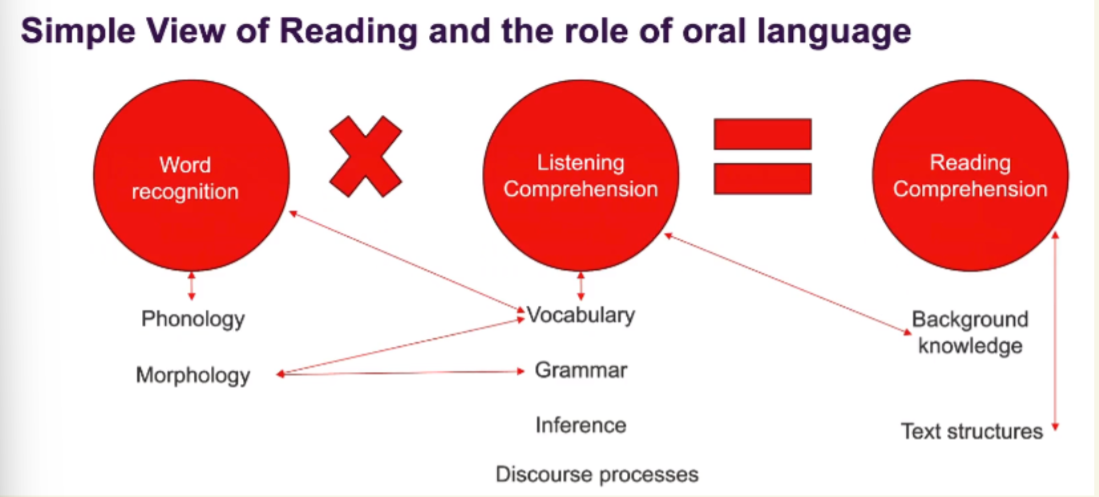EDEN100 - Week 8 - Foundational skills in acquiring word reading skills
1/13
There's no tags or description
Looks like no tags are added yet.
Name | Mastery | Learn | Test | Matching | Spaced | Call with Kai |
|---|
No analytics yet
Send a link to your students to track their progress
14 Terms
What are the foundation skills for learning to read?
Oral language (vocab and other spoken language skills)
Phonological Awareness
Print Knowledge
The Alphabetic principle
Oral language
Oral language skills provide a key foundation for learning to read. It is a complex and multi-faceted skill. It supports both decoding (word reading) and listening comprehension.
Simple view of reading and the role of oral language

Phonological Awareness
Phonological awareness is oral language skills involving understanding and manipulating units of sound. It is an umbrella term that captures multiple levels of complexity: word level, syllable level, the onset-rime level, and the phoneme level. It includes blending and segmenting. It is an important predictor of later reading success.
What is the phonological awareness skill recognizing/identifying/isolating?
The ability to recognize a sound
What is the phonological awareness skill blending?
The ability to combine units of sound to make a larger unit of sound
What is the phonological awareness skill deletion or addition?
The ability to remove or add a smaller unit of sound to a larger unit of sound.
What is the phonological awareness skill generating?
to produce a sound
What is the phonological awareness skill segmentation?
The ability to separate units of sound into smaller units of sound
What is the phonological awareness skill substitution?
The ability to replace a unit of sound with another unit of sound
What is print knowledge?
"Print Knowledge” captures everything that young children know about print.
includes print knowledge (concepts about print: print conventions and print units) and alphabet knowledge (letter names and letter sounds)
Alphabet knowledge includes the ability to both recognise and produce letter names and sounds and to connect them.
Lays the foundation for learning the alphabetic principle and is an important predictor of children’s later reading skills.
What is the Alphabetic Principle?
The Alphabetic Principle is a visual symbol of writing code for spoken speech sounds, it is a perquisite for early reading progress. Grasping the alphabetic principle puts children on a path to phonological decoding and it must be explicitly taught.
What is Home Literacy Environment?
Home Literacy Environment is all literacy-related interactions, behaviours and resources that children encounter in the home. Children vary in terms of the language and literacy input that they experience at home.
What are implications of poorly developed foundational reading skills?
If a child arrives at school and begins the process of learning to read with poorly developed foundational skills for reading then they will be at risk of making slow progress